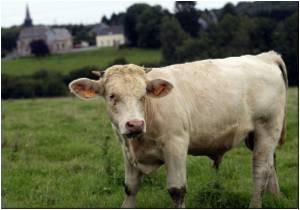Farmer Lacir Soares is promoting sustainable cattle rearing that shuns deforestation and meets the environmental requirements of a new forestry law in a remote corner of the Brazilian Amazon.

Over the past decade, cattle ranching has driven deforestation and many consumers were concerned that the meat they were buying was responsible for destroying the world's biggest rain forest.
Today, field rotation coupled with genetic improvement of cattle and better pastures help Soares produce more in his "Boqueirao" farm without damaging the forest.
With more than 200 million head of cattle, Brazil is the world's top beef exporter -- 20 percent of beef exports come from the Amazon region -- but it also leads in low productivity: one cow per hectare (about 2.5 acres).
Soares manages to feed 2.3 head per hectare thanks to his more sustainable practices.
"The balance between cattle and forest is not just a legal obligation, it also ensures higher productivity," said Soares, a fit 69-year-old farmer and lawyer sweating under the stifling heat.
Advertisement
--- The fight against deforestation --
Advertisement
The environmental group Greenpeace then released an explosive report alleging that meat and leather from deforested areas were finding their way into the industry that supplies top shoe and fashion companies as well as supermarkets and even the car industry.
The allegations pushed the industry into seeking more effective programs, said Fernando Sampaio, executive head of the Brazilian Meat Exporters Association.
Part of the solution came from technology.
In a huge area where access is difficult, satellite maps updated almost in real time make it possible to monitor where illegal logging is taking place.
Under the new forestry legislation that took effect last October, the federal government requires producers to submit to a census which determines the forest areas that must be preserved.
-- A sustainable meat business --
Marfrig, Brazil's second biggest meat processor and distributor, also moved to promote sustainability.
It joined hands with US retail giant Walmart and the US environmental group, The Nature Conservancy, to turn some local farms into environmental and economic models of meat production that can be replicated in other parts of the Amazon.
One example is Soares' ranch, touted as proof that sustainability can be good business.
"Without such sustainable practices, perhaps we could not have sold to markets such as Europe where consumers are very environmentally conscious," said Mathias Almeida, Marfrig's sustainability manager.
In Paris this year, the luxury brand Gucci launched a bag made with Amazon leather that includes environmental sustainability certification.
"The siege of cattle ranchers relying on deforestation has helped to drastically curb deforestation," prosecutor Daniel Azeredo Avelino told AFP.
He said that most major meat producers have accepted the bargain.
"If they persist in deforesting, they will lose access to markets," he said.
Years earlier, a similar deal with the soybean industry, which is much more concentrated and easier to control, made it possible to slow illegal logging in the region.
Source-AFP









